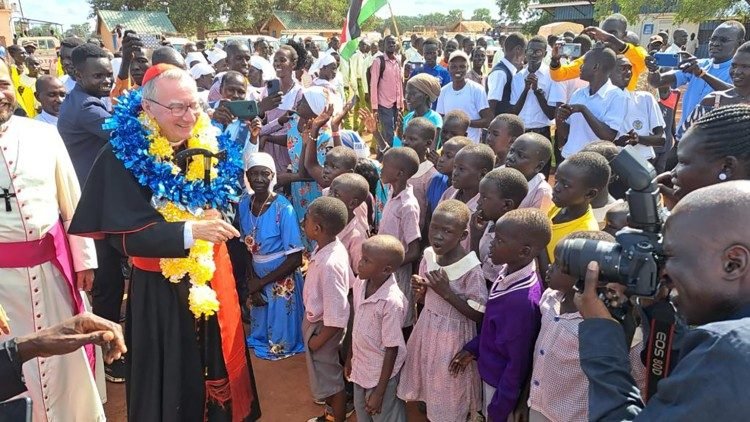Cardinal Secretary of State Pietro Parolin celebrates Mass in the South Sudanese city of Rumbek, and invites everyone to walk along the paths of peace and reconciliation for the good of the country.
By Devin Watkins
The Vatican Secretary of State, Cardinal Pietro Parolin, arrived Thursday morning in Rumbek, the capital of South Sudan’s Lakes State and the former capital of the country.
Cardinal Parolin had spent two days in the northern city of Malakal to show the Church’s closeness to people afflicted by natural and man-made disasters and to refugees and internally-displaced people.

Cardinal Parolin processes into Mass in Rumbek
Moment of prayer and communion
Upon his arrival in Rumbek on Thursday, the Cardinal expressed his joy at the chance to return to South Sudan for the third time in just over a year.
He first came to the African nation in July 2022 in Pope Francis’ stead after the Holy Father was forced to postpone his planned Apostolic Journey due to his health. Cardinal Parolin then returned to South Sudan with the Pope on 3-5 February 2023.
In remarks at a welcoming ceremony on Thursday morning, the Cardinal said his third visit to South Sudan is meant to shore up the implementation of the peace process at the indication of Pope Francis.
He added his visit to Rumbek represents an opportunity to share a “moment of faith, of prayer, and of communion in the Church.”
Fear driven out by perfect love
The Cardinal Secretary of State then celebrated Mass for Peace and Reconciliation in Rumbek.
In his homily, the Cardinal reflected on the Gospel reading, which recounted how Jesus came to the disciples in the Upper Room after his Resurrection as they cowered in fear.
“We know what it means to live in a continual state of insecurity and fear,” he said. “Violence can erupt so easily and for no apparent reason.”
He said that just as Jesus calmed their fears, so also does the Lord come to us and invite us to trust in Him.
Oftentimes, said Cardinal Parolin, we are tempted to trust more in our own strength or worldly power than in the transformative power of the Risen Lord.
“Sin makes people weak and fragile, unable to sympathize with others in their suffering, unable to strive for justice, peace and communion, unable to build a more fraternal community,” he said.
However, he added, “fear is driven out by perfect love” and Christians are able to put aside our fears by trusting in God and working for truth and justice.

Cardinal Parolin at Mass in Rumbek
Disarming our hearts
Cardinal Parolin went on to reflect on our duty as Christians to serve one another and the Gospel.
He urged everyone to work toward reconciliation, saying this task is an important element of our Christian mission, since Jesus entrusted the duty of reconciliation to the Church.
“Forgiveness,” he said, “is the key that unlocks the door to peace and justice – the forgiveness that Christ won for us on the cross.”
“Either we disarm our heart and give up violent means of solving our differences,” he added, “or we destroy ourselves.”
Nonviolence, said the Cardinal, is the only way to overcome any form of division in the community.
South Sudan needs to “look beyond all differences” and find ways to heal the divisions of society.
Jesus, he noted, is our bond of unity and brings us together in communion.
The Sacraments, said Cardinal Parolin, offer an invitation for the people of South Sudan to recognize the presence of Christ in their midst and embrace the path of peace.
“In your search for justice and peace, listen to what the Lord God has to say,” he said. “Christ is the Father’s word of peace to us”.[ Photo Embed: Group photo of priests concelebrating with Cardinal Parolin in Rumbek]
Restarting the peace process
Cardinal Parolin concluded his homily by recalling Pope Francis’ words to South Sudan’s civil leaders during his Apostolic Journey.
“Dear friends, it is time to move from words to deeds,” said Cardinal Parolin, repeating the Pope’s words. “It is time to turn the page: it is the time for commitment to an urgent and much-needed transformation. The process of peace and reconciliation requires a new start.”



